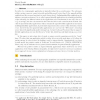Free Online Productivity Tools
i2Speak
i2Symbol
i2OCR
iTex2Img
iWeb2Print
iWeb2Shot
i2Type
iPdf2Split
iPdf2Merge
i2Bopomofo
i2Arabic
i2Style
i2Image
i2PDF
iLatex2Rtf
Sci2ools
IACR
2016
2016
Key Derivation for Squared-Friendly Applications: Lower Bounds
Security of a cryptographic application is typically defined by a security game. The adversary, within certain resources, cannot win with probability much better than 0 (for unpredictability applications, like one-way functions) or much better than 1 2 (indistinguishability applications for instance encryption schemes). In so called squared-friendly applications the winning probability of the adversary, for different values of the application secret randomness, is not only close to 0 or 1 2 on average, but also concentrated in the sense that it’s second central moment is small. The class of squared-friendly applications, which contains all unpredictability applications and many indistinguishability applications, is particularly important in the context of key derivation. Barak et al. observed that for square-friendly applications one can beat the “RT-bound”, extracting secure keys with significantly smaller entropy loss. In turn Dodis and Yu showed that in squaredfriendly app...
Biometrics | IACR 2016 |
Related Content
| Added | 03 Apr 2016 |
| Updated | 03 Apr 2016 |
| Type | Journal |
| Year | 2016 |
| Where | IACR |
| Authors | Maciej Skorski |
Comments (0)

